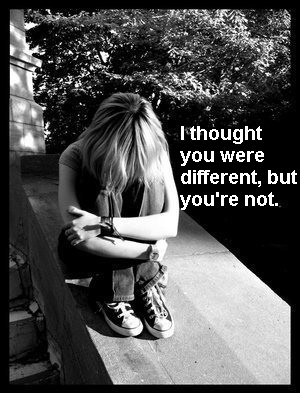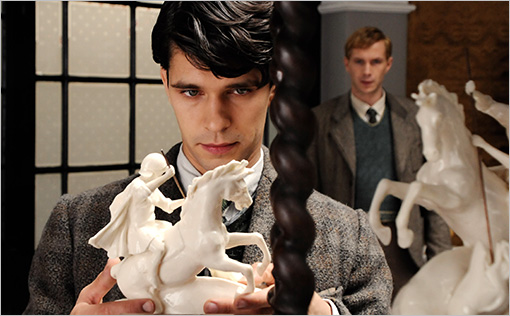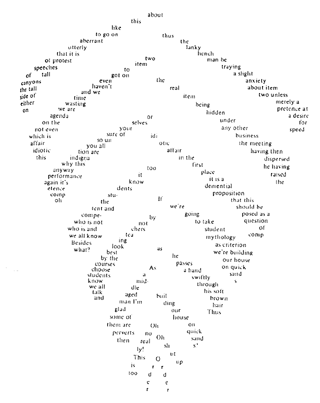25 Points: Cloud Atlas
1. Dear God did I want to like this.
2. I’m something of a fan of the Wachowskis. Bound and Speed Racer are fun, and I adore the Matrix Trilogy (yes, even the sequels). And I have nothing against Tom Tykwer, either. I enjoyed Run, Lola, Run, and admired his stab at making a Kieslowski (Heaven). I wish there were more filmmakers out there like the three of them.
3. Cloud Atlas is pretty well-directed. It presents six different plots across six different timelines, and (speaking for myself) it was easy to follow, narratively. That’s not nothing.
4. I’ve long argued that Titanic is a very well-made film. It’s three hours long, with dozens of characters, and it never becomes confusing, never drags.
5. This will not be the first time I compare Cloud Atlas with Titanic.
November 26th, 2012 / 8:01 am
R.I.P. Christine Brooke-Rose
I just heard that Christine Brooke-Rose passed away.
I first came across her work thanks to Brian McHale’s Postmodernist Fiction (1987), where he wrote about her 1975 novel Thru.
At the time, I was deeply into concrete poetry, in particular novelists who used concrete poetry techniques (Kenneth Patchen, B.S. Johnson, Ann Quin). So I was hooked. I picked up the 1986 Christine Brooke-Rose Omnibus, which contains Thru as well as its three “companion” novels: Out (1964), Such (1966), and Between (1968). All of them are decidedly unusual; like Johnson and Quin, Brooke-Rose was heavily inspired by the French New Novel of Alain Robbe-Grillet, Marguerite Duras, and Nathalie Sarraute. (She translated Robbe-Grillet’s In the Labyrinth.) Like all of those authors, Brooke-Rose was a brilliant maker of contemporary fiction who deserves to be more widely read.
POP: A Polemic on a Contemporary Language-Based “Objectivity”
 I do not like metaphor. My personal education pertaining to literature takes a very French bent, and it is here that Robbe-Grillet himself, king of the nouveau roman one could say, has denounced metaphor, preferring, I suppose, some sort of metonymy, but–if anything–participating in the creation of a style of fiction in which the surface is more important than a subtext.
I do not like metaphor. My personal education pertaining to literature takes a very French bent, and it is here that Robbe-Grillet himself, king of the nouveau roman one could say, has denounced metaphor, preferring, I suppose, some sort of metonymy, but–if anything–participating in the creation of a style of fiction in which the surface is more important than a subtext.
I think that this adherence to the surface, at least in terms of language, is good, positive, because it removes an additional level of signification, which brings us, as a reader, closer to the experience the language itself is hiding, carrying, revealing. Though often, in the creation of atmosphere, metaphor can be adequately used to help evoke a mood, I feel like there are often more interesting ways to do this (and I suppose that here, by “interesting,” I mean “heterogeneous, diverse, wildly more creative”).
READ MORE >

“The entire system of the novel in the last century, with its cumbersome machinery of continuity, linear chronology, causality, noncontradiction, was actually a last-ditch attempt to forget the disintegrated state we were left in when God withdrew from our souls, an attempt at least to keep up appearances by replacing the incomprehensible explosion of atoms, of black holes and impasses, with a reassuring, clear, unequivocal constellation woven so closely that we’d no longer hear death howling between the stitches, amidst broken threads hastily reknotted. No objection to this grandiose, unnatural project? . . . No objection, really?”
Alain Robbe-Grillet, from Ghosts in the Mirror
10 part lecture by Alain Robbe-Grillet
Beginning with Part 2, as Part 1 is a very long introduction to his work. Overall it’s kind of slow going as he requires a translator, but still interesting and worthwhile if you have the time. Parts 3-10 available thru links thereafter.
See also: this documentary by Luc Lagier on Last Year at Marienbad, directed by Alain Resnais, and cowritten by Robbe-Grillet (available now from Criterion).



